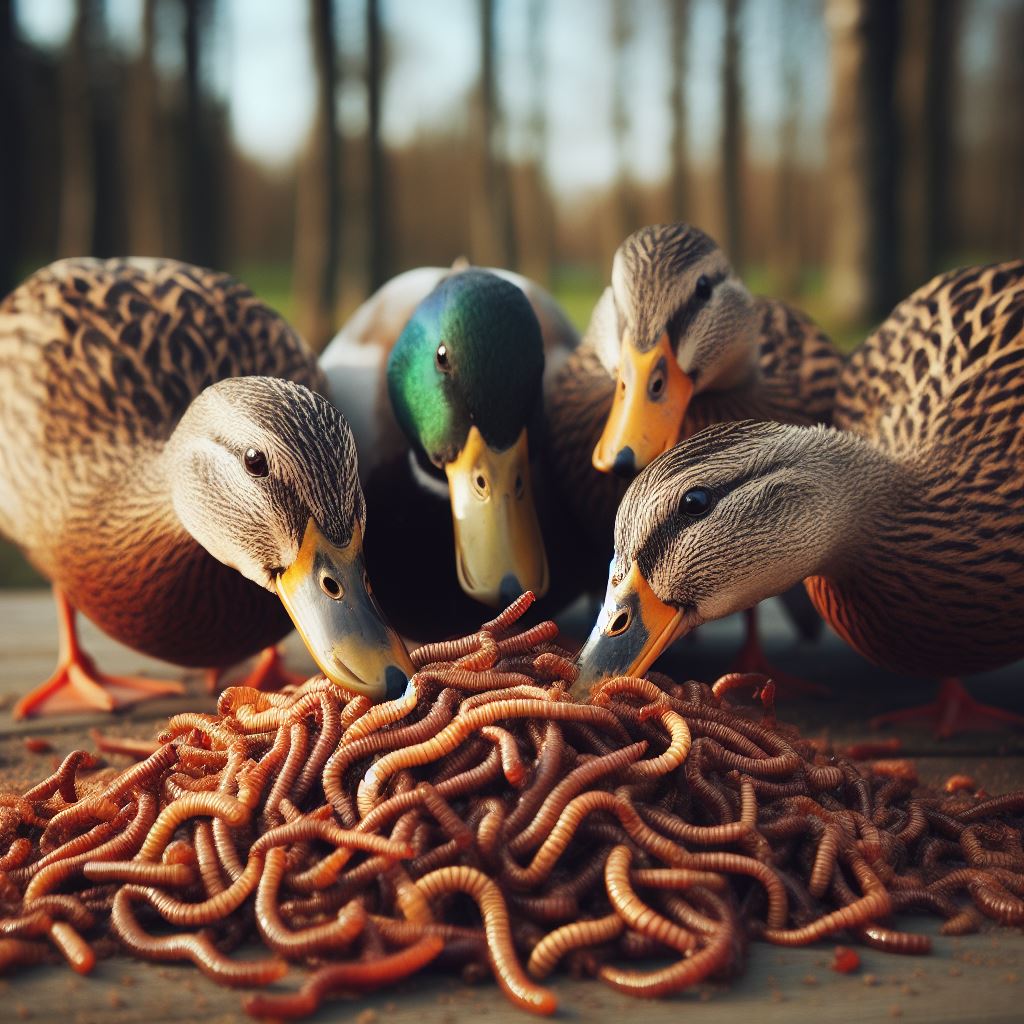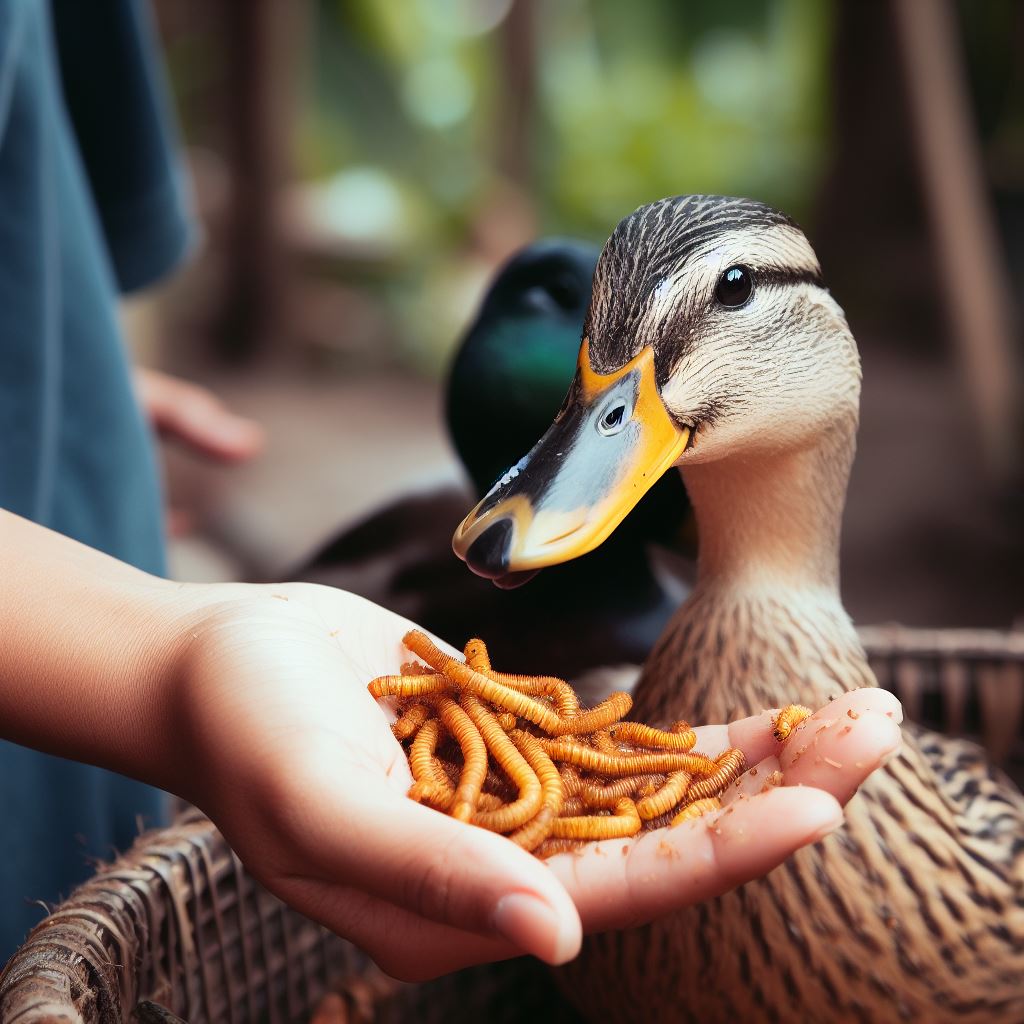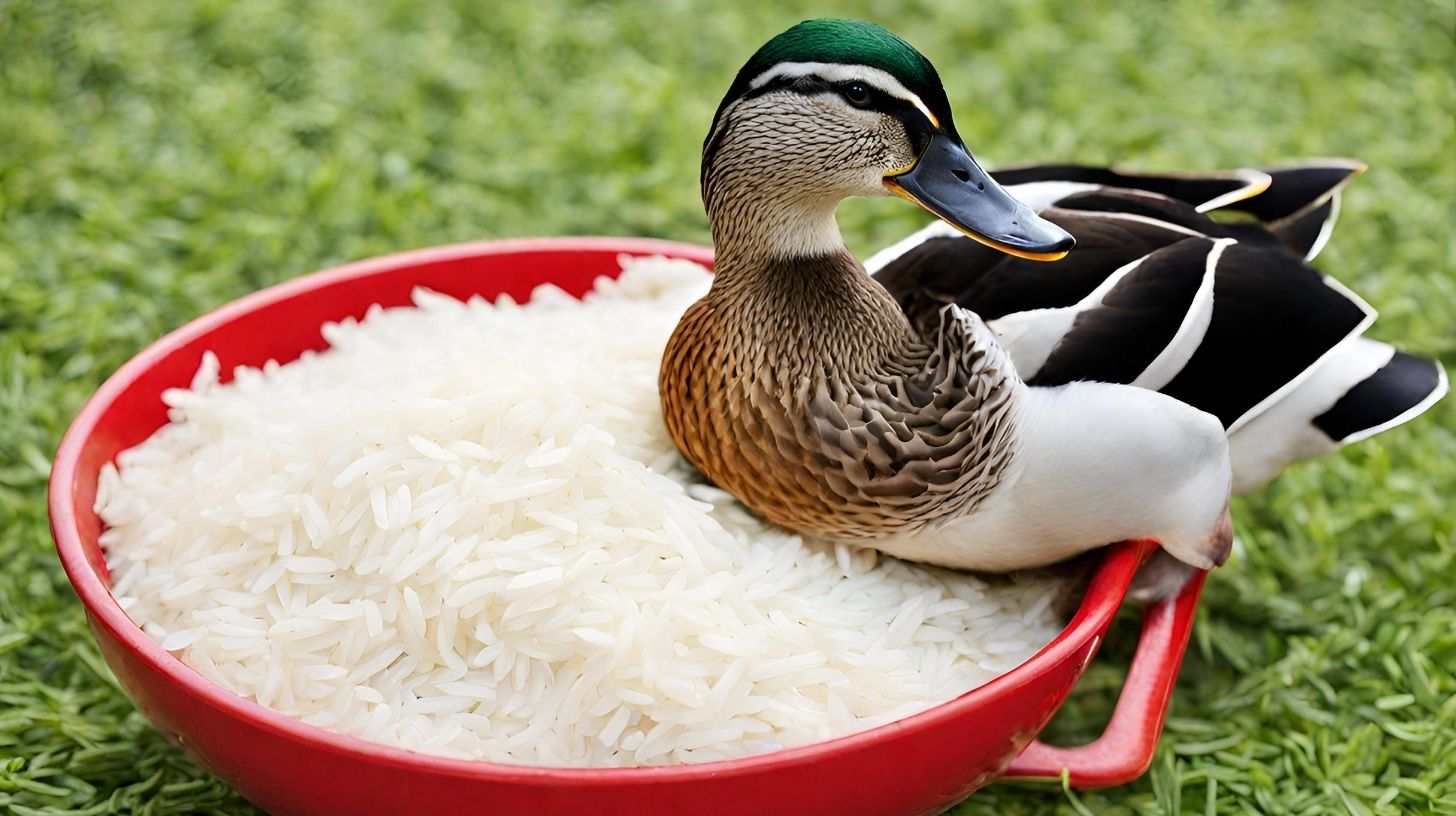Can Ducks Eat Mealworms? Nutrition and Feeding Tips

Table of content:
Can ducks eat mealworms? Ducks can safely eat mealworms in moderation as part of a balanced diet. Mealworms contain beneficial nutrients but can also pose potential health risks if fed irresponsibly. This comprehensive guide provides duck owners with the key information they need for responsibly incorporating mealworms into their ducks’ diets.
Key Takeaways:
- Mealworms contain protein, fat, and other nutrients useful for duck health.
- Too many mealworms can cause obesity and issues like impacted crops.
- Mealworms should compose only a small portion of a duck’s diet.
- Soak mealworms in water before feeding to reduce risks.
- Avoid mealworms for young ducklings. Wait until ducks are 4-6 weeks old.
An Overview of Feeding Mealworms to Ducks
Mealworms are the larval form of the mealworm beetle (Tenebrio molitor). They are commonly used as a food source for chickens, ducks, and other poultry.
Many duck owners want to know if they can offer mealworms to their ducks as a supplemental food source in addition to their main diet. The short answer is yes, ducks can safely consume mealworms in moderation.
However, there are some important factors to consider before including mealworms in your ducks’ diet:
- Mealworms are high in protein and fat content. This can be beneficial but also poses risks if overfed.
- Mealworms have hard exoskeletons that can cause potential choking hazards or crop impactions. Always soak in water before feeding.
- Mealworms should only comprise a small portion of a duck’s diet. They do not provide complete nutrition.
- Avoid feeding mealworms to young ducklings under 4-6 weeks old. Wait until they are fully feathered.
By following some basic guidelines, duck owners can safely provide mealworms as a supplemental treat. Read on to learn more about the benefits and risks, proper feeding guidelines, and how to include mealworms as part of a balanced homestead duck diet.
 The Nutritional Value of Mealworms for Ducks
The Nutritional Value of Mealworms for Ducks
Mealworms can be a useful supplemental food for ducks due to their nutritional value. Here are some of the main nutrients found in dried mealworms:
- Protein: Mealworms contain 48-60% protein, giving ducks an excellent source of this essential nutrient for growth and development.
- Fat: The fat content of dried mealworms ranges from 24-43%. This makes them a high-energy food source.
- Calcium: With about 0.2% calcium, mealworms provide a bioavailable source of calcium for bone health.
- Fiber: Around 5-8% crude fiber helps support duck digestive health.
- Vitamins and Minerals: Mealworms contain a variety of vitamins and minerals like vitamin A, vitamin B12, zinc, and iron.
In the right quantities, these nutrients can support muscle growth, egg production, bone strength, and general duck health and development. However, the nutritional makeup of mealworms needs to be kept in mind to prevent potential issues.
| Nutrient | Percentage |
|---|---|
| Protein | 48-60% |
| Fat | 24-43% |
| Calcium | 0.2% |
| Fiber | 5-8% |
The Potential Risks of Feeding Ducks Too Many Mealworms
While nutritious in moderation, providing too many mealworms can also pose some risks, including:
Obesity & Fatty Liver Disease
With their high fat content, overfeeding mealworms can quickly lead to excess fat gain and obesity in ducks. Obese ducks are prone to developing hepatic lipidosis, also known as fatty liver disease. This can cause severe liver damage and death.
Crop Impaction
Mealworms have tough external skeletons. Eating too many can compact in the crop, leading to a blocked digestive tract. This requires emergency surgery to fix and can be fatal if left untreated. Always soak mealworms before feeding.
Nutritional Imbalances
Mealworms lack some essential nutrients like vitamin A and shouldn’t form the bulk of a duck’s diet. An excess of mealworms can cause nutritional deficiencies over time.
Issues for Young Ducklings
Avoid feeding mealworms to ducklings under 4-6 weeks old. Their digestive systems cannot yet handle the chitin in the exoskeleton, causing impaction risks.
By keeping mealworms to around 5-10% of the total diet, duck owners can provide the benefits of this supplemental food while avoiding the potential downsides. Monitor duck weight and health closely when offering any high-fat treats like mealworms to prevent obesity-related issues.
Best Practices for Feeding Mealworms to Ducks
Follow these tips for safely incorporating mealworms into your homestead ducks’ diet:
- Start slowly with small amounts to observe any issues.
- Provide mealworms in moderation – no more than 5-10% of the total diet.
- Soak mealworms in water for 1-2 hours before feeding to soften their exoskeletons.
- Hand feed soaked worms and monitor intake amounts for each duck.
- Avoid free-choice feeding of dry mealworms which allows ducks to overeat.
- Prevent fighting by offering worms scattered over a broad area.
- Introduce mealworms gradually to ducklings once 4-6 weeks old.
- Feed worms as an occasional treat, not daily.
- Watch for signs of crop impaction like decreased appetite or difficulty swallowing.
- Weigh ducks weekly and adjust or stop mealworm feeding if obesity is observed.
Following these best practices allows duck owners to safely provide mealworms as part of a balanced diet without risking potential health problems.
What Do Ducks Like to Eat Besides Mealworms?
While nutritious as an occasional treat, mealworms should not form the bulk of a duck’s diet. Ducks need a balanced combination of foods to thrive. Here are some other top options:
Commercial or Homemade Duck Feed
High-quality duck feed provides the full spectrum of a duck’s nutritional needs. Choose a reputable brand and provide 1/4-1/2 lb of feed per duck daily. Homemade mixes should be formulated by a qualified poultry nutritionist to avoid deficiencies.
Dairy Products
Ducks love yogurt, cottage cheese, and other dairy items. These provide protein, calcium, and probiotics. Offer in moderation due to the fat content.
Greens and Vegetables
Chopped kale, spinach, swiss chard, peas, broccoli, carrots, squash and many other veggies make excellent duck treats. Vegetables provide vitamins, minerals and fiber.
Fruits
Slices of apple, banana, melon, berries, and citrus fruits are perfect for ducks. They are rich in beneficial nutrients and provide variation to the diet.
Insects
When available, let ducks hunt for insects like grubs, crickets and worms. These protein sources supplement their commercial feed.
Mealworms can be an excellent supplemental addition to a balanced duck diet. Follow the best practices outlined to provide ducks with the benefits of mealworms safely while meeting all their dietary needs for optimal health and growth.
Frequently Asked Questions About Feeding Mealworms to Ducks
Can ducklings eat mealworms?
No. Avoid feeding mealworms to ducklings under 4-6 weeks old. Their digestive systems cannot safely process the chitin in mealworms, posing impaction hazards. Wait until ducklings are fully feathered before slowly introducing mealworms.
How many mealworms should I feed my ducks?
As a treat, ducks can eat around 2-4 mealworms per feeding, 1-2 times per week. Mealworms should never exceed 5-10% of the total daily diet for ducks. Overfeeding them risks obesity and health issues.
Should I feed mealworms to wild ducks?
While wild ducks can eat mealworms, it’s best to limit supplemental feeding. Too much artificial feeding can lead to malnutrition and dependence. Contact local wildlife authorities to discuss proper wild duck feeding guidelines.
How long is it safe to feed my ducks mealworms?
Mealworms are safe for ducks when fed occasionally in moderation. Avoid long-term daily mealworm feeding, which can cause nutritional imbalances or obesity over time.
Why soak mealworms before feeding ducks?
Soaking mealworms in water for 1-2 hours before feeding ducks softens their outer shell (chitin). This helps prevent potential crop impaction issues that can occur when ducks consume too many dry, hard mealworms.
Conclusion
When used responsibly as part of a balanced diet, mealworms represent a nutritious supplemental food choice for ducks. Their protein and healthy fat can support duck growth and egg production. However, improper overfeeding also poses some health risks to ducks like obesity and impactions.
Following the guidelines in this article allows duck owners to safely incorporate mealworms as a treat their ducks will enjoy while optimizing their nutrition and avoiding potential problems.
Monitoring your duck flock’s health and adjusting their mealworm intake accordingly lets you provide the benefits of variety in moderation.
Welcome. I’m Adreena Shanum, the proud owner of this website, and I am incredibly passionate about animals, especially poultry. I founded adreenapets.com as a labor of love, stemming from my desire to share my knowledge and experiences with poultry enthusiasts worldwide.




